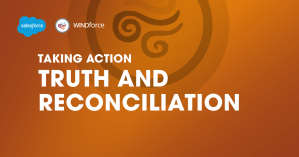Originally launched eight years ago and taking place on September 30, Orange Shirt Day represents our National Day for Truth and Reconciliation. It is a time to confront the difficult realities of the trauma caused by our legacy of colonization, and honour the children, survivors, families and indigenous communities affected by residential schools. It’s also a moment to reflect deeply, and to consider how we can collectively move forward in healing.
Instead of looking at it as an opportunity for your business, in other words, Orange Shirt Day is a moment to pause, listen, learn and be part of meaningful change. It’s not a process that begins and ends on a single holiday, but an ongoing commitment of time and effort. It also requires the humility to admit that no single organization — Salesforce included — has all the answers.
If you’ve never formally observed Orange Shirt Day before, what follows is some background information, resources to learn more, and a few thoughts on how you can take part — either as an organization or an individual.
The History And Meaning Behind Orange Shirt Day
The importance of understanding the issues around truth and reconciliation became clearer than ever this past May. That was when the remains of 215 children were found on the site of a former Indigenous residential school in Kamloops. This was followed by the June discovery of at least 600 unmarked graves at a former Marieval Indian Residential School.
This was just further evidence of the damage caused by residential schools run by the government from 1880 to 1996. An estimated 150,000 children attended these schools, which were overseen by religious organizations. This meant taking Indigenous children, forcibly at times, from their communities and families. They were often brought to distant locations where all cultural identity was stripped away from them.
At least 6,000 children never made it home from residential school, and what survivors endured is still felt today, across multiple generations. An attempt to redress the legacy led to the 2015 Truth and Reconciliation report, which includes 94 calls to action covering areas such as child welfare, health and justice.
Orange Shirt Day, meanwhile, started in 2013 following a gathering of residential school survivors in Williams Lake, B.C. It was inspired by the story of Phyllis (Jack) Webstad, whose orange shirt that had been gifted to her by grandmother, was taken away on her first day of residential school.
Today, thousands of Canadian teachers, students and community members wear orange in solidarity — both for the memory of those children who survived residential schools and for the memory of those who never made it home.
Digging Deeper Into The Truth And Reconciliation Process
If you really want to honour the diversity of Indigenous peoples in Canada and become a more active ally, there are plenty of ways to deepen your knowledge, understanding and empathy of the truth and reconciliation process.
This starts with going beyond the high-level overview to more specific accounts of the history. For example, research and policy expert Ginger Gosnell-Myers offers an excellent discussion from a 2018 TEDxVancouver event called ‘Canadian Shame: A History of Residential Schools,’ and it’s freely available on YouTube.
One of the most critically-acclaimed books on the lives of residential school students, meanwhile, came from Tanya Talaga. Seven Fallen Feathers: Racism, Death, and Hard Truths in a Northern City focuses on a specific school in Thunder Bay, Ontario, but reflects the human rights violations against Indigenous communities across the entire country.
Then there’s ‘Residential Schools,’ a podcast created by Historica Canada that began as a three-part series, but has expanded into ongoing explorations of Canadian multiculturalism.
And of course, it’s important to remember that the Truth and Reconciliation report is also available online and offers a comprehensive look at what moving forward as a nation could look like.
Taking Action On Truth And Reconciliation
Building upon what you learn about the history of the residential school system, you can begin taking direct action by acknowledging the Indigenous custodians of the land on which you reside or do business. One way Salesforce employees do this is by creating a space for a land acknowledgment at the beginning of presentations, which is a way for people to bring awareness to Indigenous presence and land rights in everyday life. You can also make efforts to learn about current issues that continue to affect their communities.
Other steps could include supporting and donating to organizations that are advancing racial equality and justice. A good example is the Indian Residential School Survivors Society, an organization providing services to Indian Residential School Survivors. Financial contributions are also accepted by the Orange Shirt Day Society, the First Nations Child and Family Caring Society as well as local organizations in many provinces.
You can look even closer to home to join an Orange Shirt Day-related event in your community. And think about how you might use your business as a platform for change, whether it’s amplifying diverse voices on your social media channels or encouraging your staff to don orange shirts and engage with the issues as a team.
Support Indigenous Communities Every Day, Not Just Orange Shirt Day
When it comes to active allyship, we must be mindful of the fact that it’s an ongoing journey. In other words, as we honor the past, it’s important that we support and uplift Indigenous communities of today as well.
At Salesforce, we’ve tackled this in numerous ways, starting with listening to and supporting our Equality group, WINDforce — which stands for Worldwide Indigenous Network of Diversity. In doing so, we’ve: hosted events to raise awareness about violent crimes against Indigenous women, been adamant about the use of inclusive language, partnered with nonprofits to provide financial support to Indigenous communities, and are continuously partnering with organizations to help create access to Indigenous talent seeking careers in tech.
Salesforce stands with all Indigenous communities across Canada, and we know the process of healing is just beginning. Let’s all use Orange Shirt Day as the kick-off for an effort to work even harder towards justice and equality for all.
























